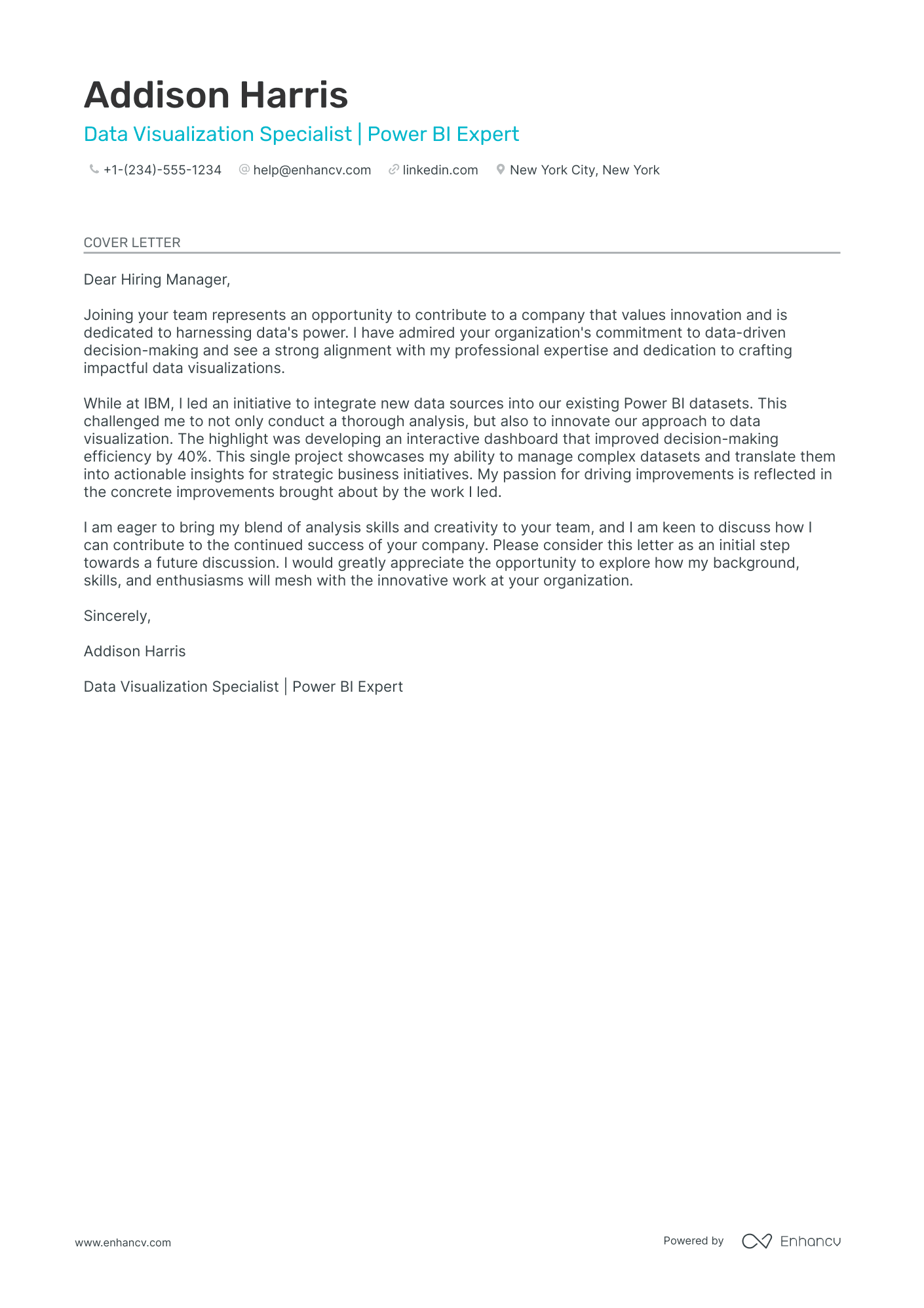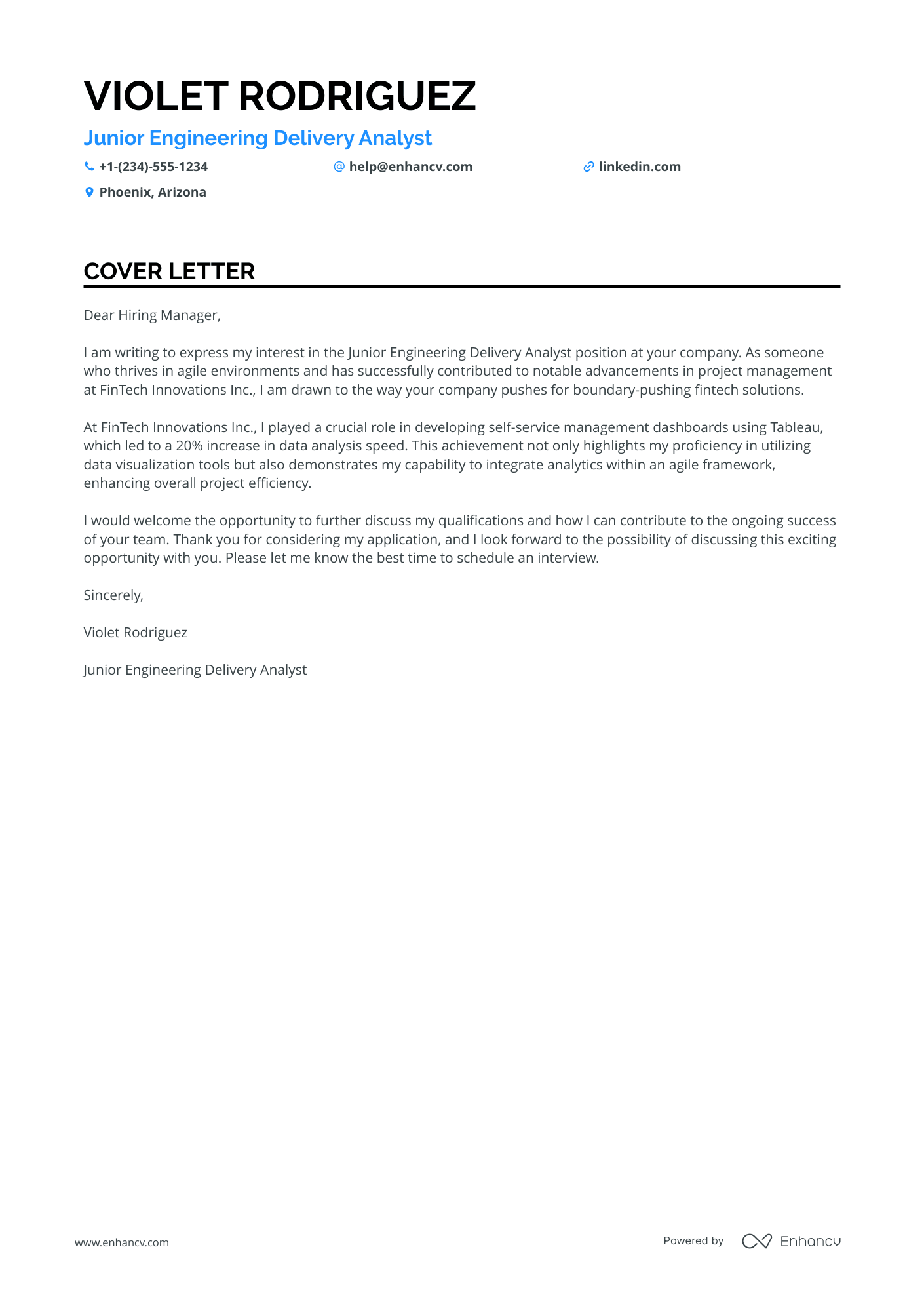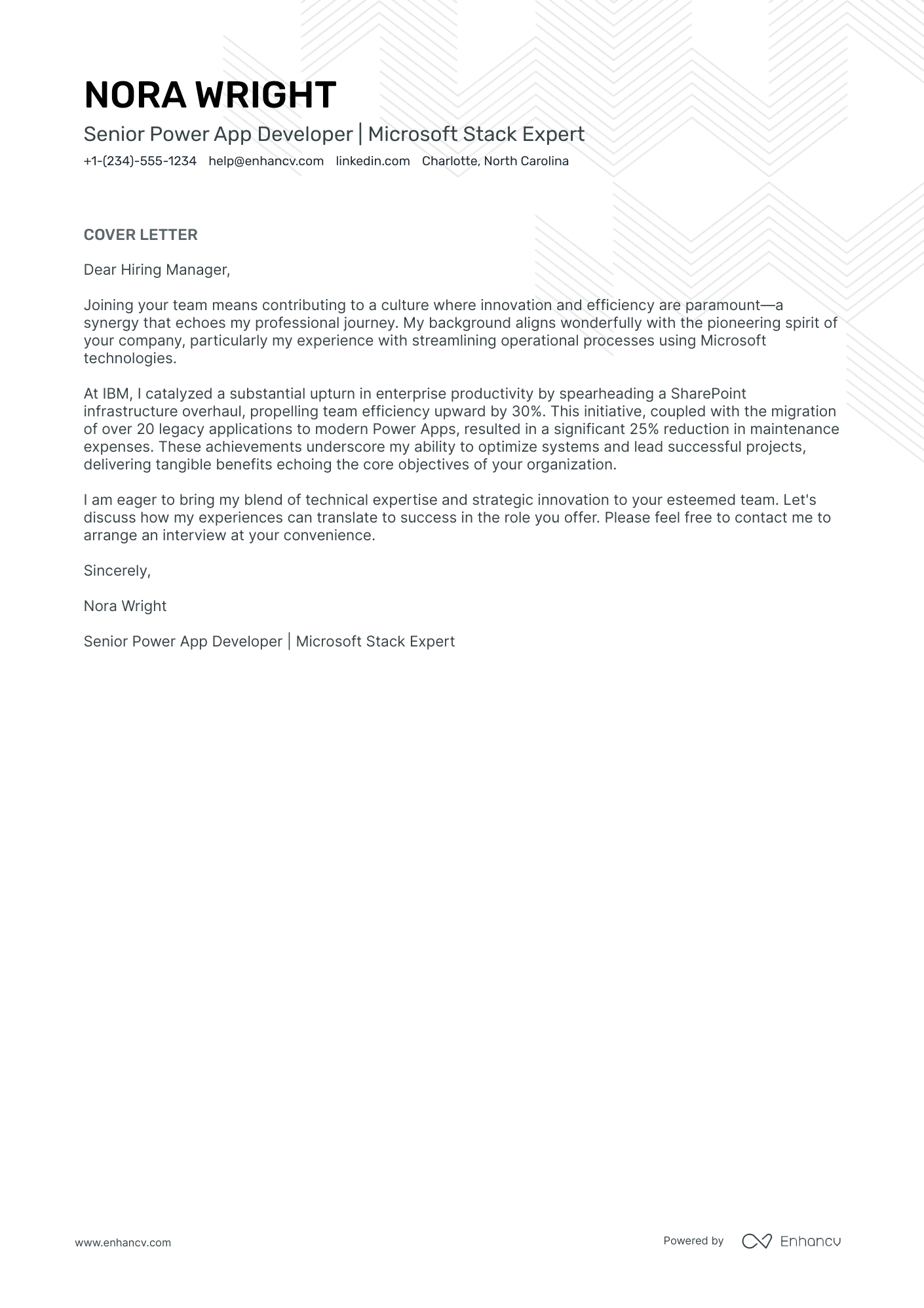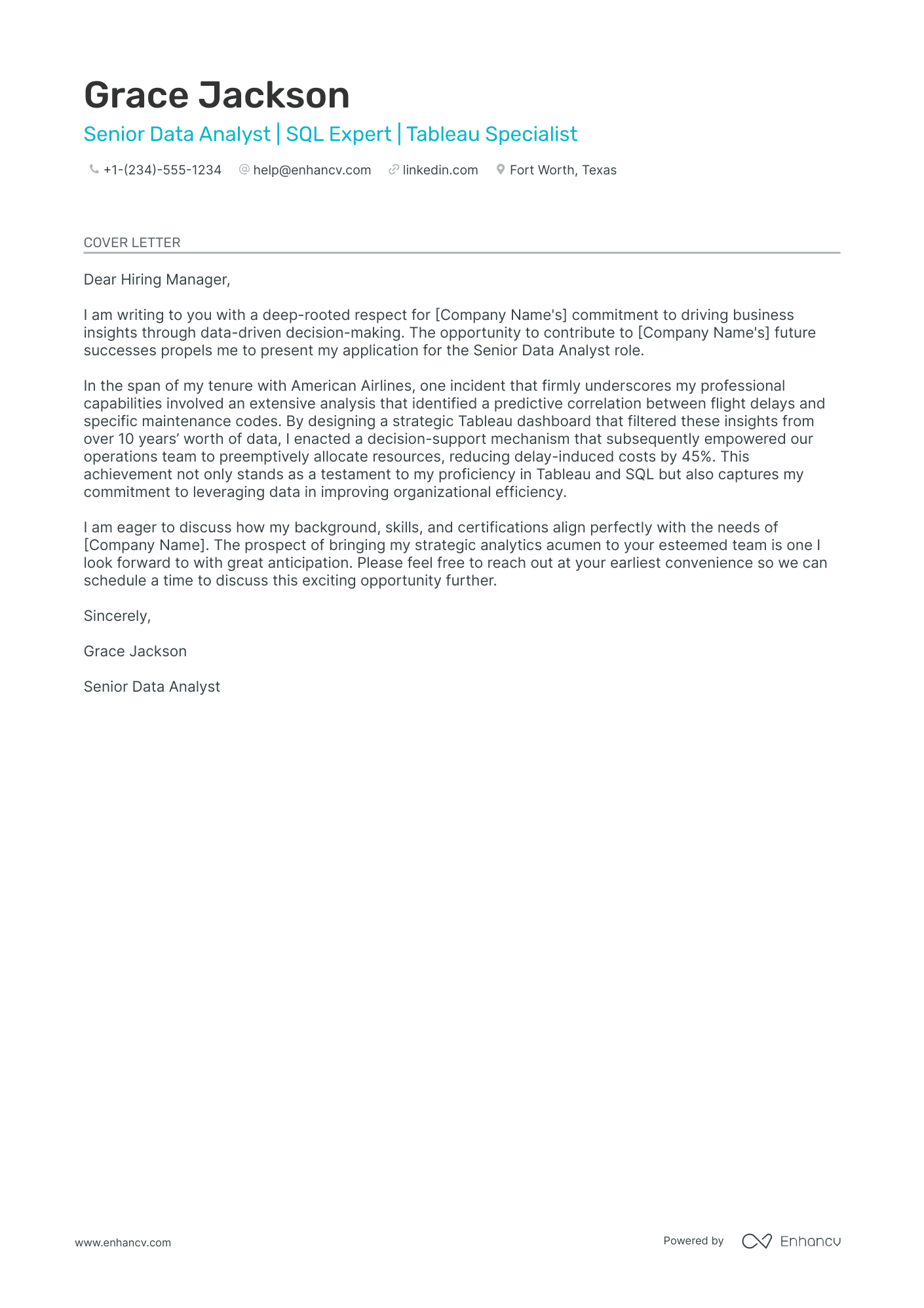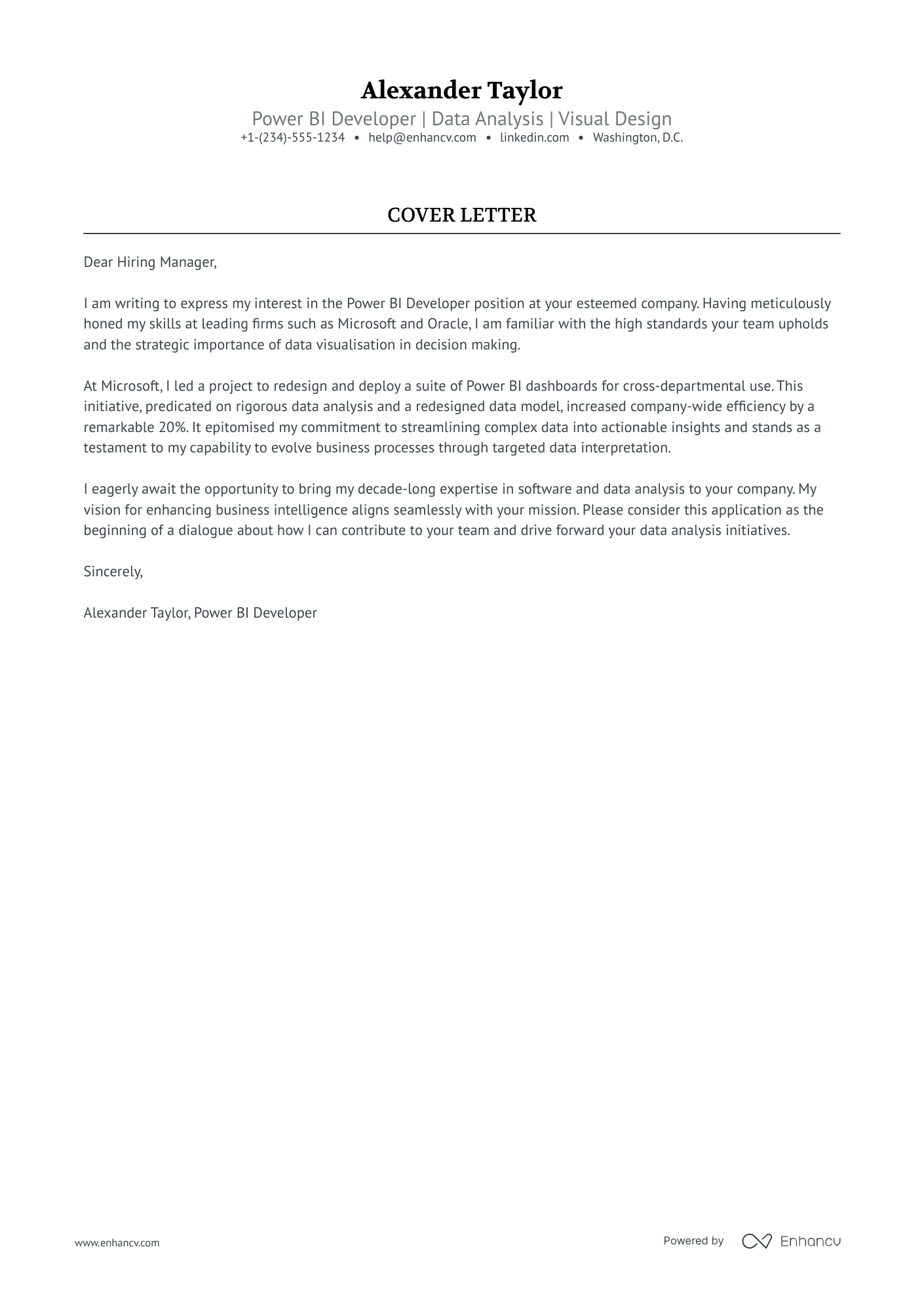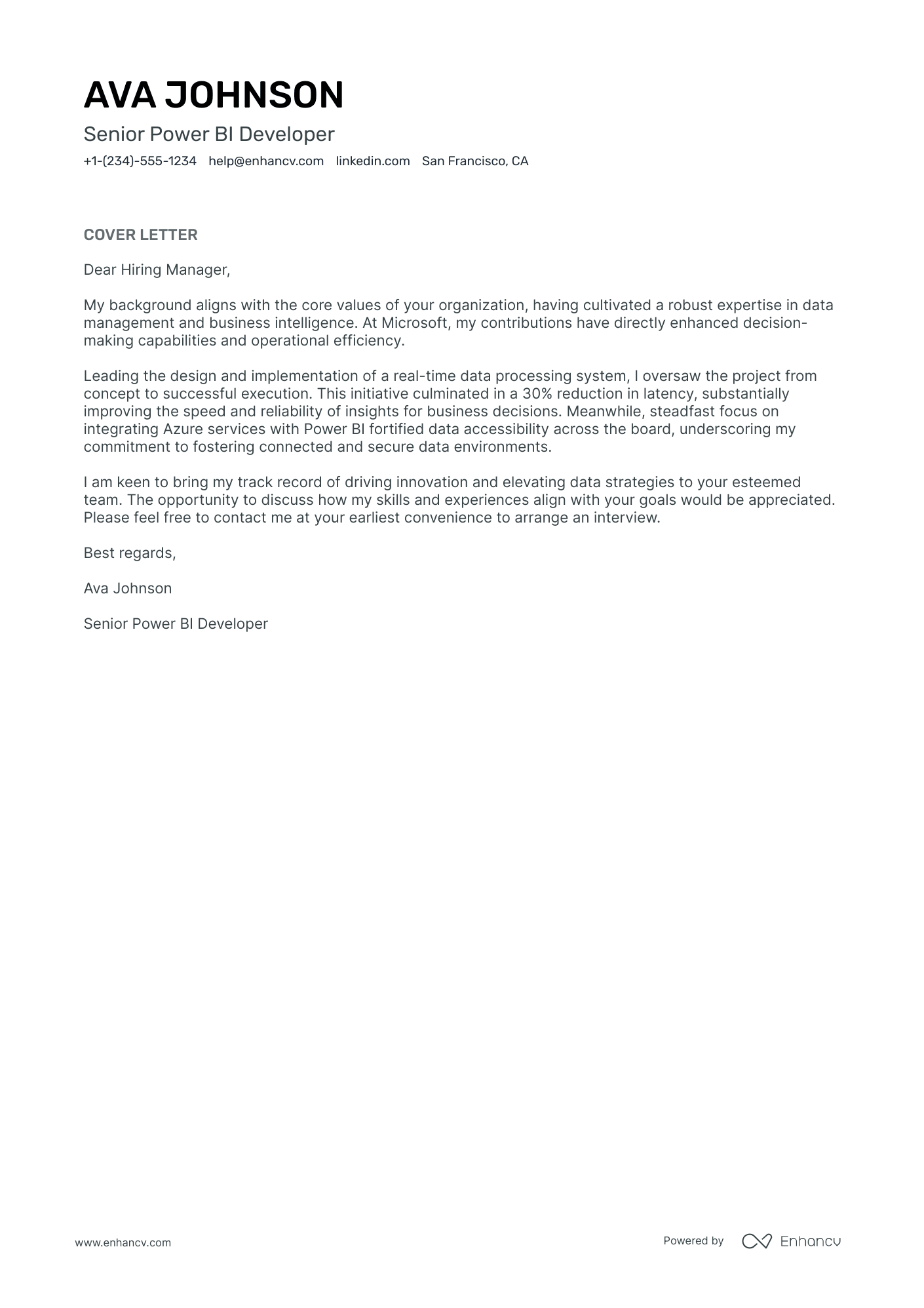As you dive into the Power BI job market, the realization hits: a standout cover letter is not just optional—it's essential. Crafting this pivotal document can feel daunting, especially when you’re eager to showcase your professional triumphs without echoing your resume. You know it should weave your proudest achievement into a compelling narrative, dodge the pitfalls of clichés, yet maintain a formal tone. All within the tight confines of one page. Let's demystify the process and get you noticed.
- Create a power bi cover letter to persuade the recruiters you're the best candidate for the role;
- Use industry-leading power bi cover letter templates and examples to save time;
- Dedicate your power bi cover letter space to your best achievement;
- Make sure your power bi cover letter meets recruiters' expectations and standards.
Avoid starting at the blank page for hours by using Enhancv's AI - just upload your resume and your power bi cover letter will be ready for you to (tweak and) submit for your dream job.
If the power bi isn't exactly the one you're looking for we have a plethora of cover letter examples for jobs like this one:
Drop your resume here or choose a file.
PDF & DOCX only. Max 2MB file size.
Power bi cover letter example
Timothy Duncan
New York, NY
+1-(234)-555-1234
help@enhancv.com
- Emphasizing quantifiable achievements (e.g., "development of over 50 comprehensive reports and dashboards" and "30% uptick in operational efficiency") helps demonstrate the impact of the candidate's work and sets a clear benchmark for past success.
- Highlighting experience with specific tools and technologies relevant to the job (e.g., "proficiency in data modeling, SQL, and Power BI") showcases the candidate's relevant technical skills and preparedness for the role.
- Mentioning experience in integrating diverse systems (e.g., "integration of data from disparate sources, such as Altiris, SCCM, CMDB, and SAP") illustrates the candidate's ability to handle complex technical challenges and improve interdepartmental collaboration.
- Pointing out improvements in processes or user engagement (e.g., "slashed report generation time by a quarter" and "elevated user engagement by 20%") indicates that the candidate not only understands their role but also seeks to optimize workflows and enhance the end-user experience.
The format of your power bi cover letter: structure, fonts, margins, and more
Your power bi cover letter should include a header (with your name, position, and date); a greeting and introductory paragraph; a body and closing paragraphs; and an optional signature.
Remember that you're writing your power bi cover letter for recruiters - as the Applicant Tracker System won't scan this content.
Here are a few more tips and tricks to keep in mind when formatting your power bi cover letter:
- Use the same font in your power bi cover letter and resume. We recommend modern fonts, e.g. Lato and Rubik, to help you stand out, instead of the stereotypical Arial and Times New Roman.
- Each paragraph should have single spacing, which is already set up for you in our cover letter templates.
- Our cover letter builder follows industry standards for your power bi cover letter formatting - with a one-inch margin, surrounding your content.
- Always export your power bi cover letter in PDF to ensure the image or text quality stays the same and your writing isn't moved about.
Writing cover letters just got easier. Use our free cover letter generator to create yours instantly.
The top sections on a power bi cover letter
Header with Contact Information: This section should include your full name, address, phone number, email, and LinkedIn profile, ensuring the recruiter can easily get in touch with you, and demonstrating a professional approach.
Greeting: Personalize the greeting by addressing the hiring manager or recruitment team directly; if possible, find and use their name to establish a personal connection and show attention to detail.
Introduction: Briefly express your enthusiasm for the Power BI role, touching on your relevant experience and mentioning a key achievement with the tool, to immediately appeal to the recruiter's interest in your data visualization expertise.
Professional Experience & Skills Section: Elaborate on specific projects where you utilized Power BI, including data modeling, DAX functions, report generation, and dashboard design, to showcase your technical proficiency and value addition specific to the role.
Closing and Call to Action: Conclude the cover letter by summarizing your qualifications, expressing your eagerness to discuss how you can contribute to the team, and thank the recruiter, demonstrating both professionalism and a proactive attitude.
Key qualities recruiters search for in a candidate’s cover letter
- Proficiency with Power BI tools: Demonstrates the ability to efficiently create compelling and interactive dashboards, reports, and visualizations.
- Data Analysis and Interpretation Skills: Showcases the ability to analyze large datasets, extract actionable insights, and communicate findings effectively to stakeholders.
- SQL and Data Manipulation Expertise: Indicates capability to source, cleanse, and transform data using SQL queries and other data manipulation techniques for seamless integration into Power BI.
- Business Acumen: Reflects an understanding of various business processes and objectives which is crucial to designing effective BI solutions that address specific business needs.
- Attention to Detail: Essential for ensuring the accuracy and integrity of data reports, which are the basis for critical business decisions.
- Experience with Data Modeling: Displays the ability to create and optimize data models that enhance Power BI performance and user experience, making data more accessible for end-users.
How to personalize your power bi cover letter greeting
Before you start writing your power bi cover letter, take the time to find out who is recruiting for the role.
Search for the recruiter's name on LinkedIn or the corporate website to address them personally in your power bi cover letter salutation.
What if you can't find out who's recruiting for the role?
Always aim to avoid the very impersonal "Dear Sir/Madam" - instead, opt out for "Dear HR Team" or "Dear Hiring Manager" to make a better first impression.
List of salutations you can use
- Dear Hiring Manager,
- Dear [Company Name] Team,
- Dear [Department Name] Hiring Team,
- Dear Mr./Ms. [Last Name],
- Esteemed Colleagues,
Using your power bi cover letter intro to show your dedication
We know just how difficult it is to start writing your power bi cover letter introduction.
There are so many great qualities you have as a professional, which one should you choose?
How about writing up to two sentences about your passion and commitment to the work you do or are set to do?
Try to describe exactly what you enjoy about the potential role.
A positive attitude from the get-go will help you stand out as a motivated power bi professional.
How to select your best achievement for the middle, or the power bi cover letter body
You probably feel exhausted by this point in your application: you've dived into all the details of your success and skills in your power bi resume.
What else can you include in your power bi cover letter body?
Well, for starters, the next three to six paragraphs should show you further value as a professional. Or, why should recruiters choose you?
Think back on a noteworthy achievement that answers key job requirements and dive deep.
Structure your power bi cover letter middle as you'd a story: following chronological logic and highlighting outcomes, thanks to skills.
At the end of the day, you'd want recruiters to be able to see you as the best candidate for the role and understand more about who you are and what makes your success unique (and valuable to the role).
Closing paragraph basics: choose between a promise and a call to action
You've done all the hard work - congratulations! You've almost reached the end of your power bi cover letter.
But how do you ensure recruiters, who have read your application this far, remember you?
Most power bi professionals end their cover letter with a promise - hinting at their potential and what they plan on achieving if they're hired.
Another option would be to include a call for follow-up, where you remind recruiters that you're very interested in the opportunity (and look forward to hearing from them, soon).
Choose to close your power bi cover letter in the way that best fits your personality.
Is it beneficial to mention that you have no experience in your power bi cover letter?
Lacking professional experience isn't the end of the world for your power bi cover letter.
Just be honest that you may not have had roles in the industry, but bring about so much more.
Like, your transferable skills, attained thanks to your whole work and life experience (e.g. the skills your summer spent working abroad taught you).
Or, focus on what makes you, you, and that one past success that can help you stand out and impress recruiters (think of awards you've attained and how they've helped you become a better professional).
Alternatively, write about your passion and drive to land the job and the unique skill set you would bring to enhance the workplace culture.
Key takeaways
Summarizing the most important aspects in writing your power bi cover letter, remember to:
- Create a personalized power bi cover letter for each role you apply for, that includes the recruiter's name in the salutation;
- Format your power bi cover letter with single-spacing, one-inch margins, and a modern, yet ATS-friendly font;
- Always start off your power bi cover letter with two sentences that reflect what is most important about your application;
- Your power bi cover letter body should feature your biggest accomplishments and the job-relevant skills it has taught you;
- Instead of opting for the "Sincerely yours" ending, close your power bi cover letter with a nod to the future with what you aim to achieve in this potential role.
Power Bi cover letter examples
By Experience
Senior Power BI Developer
Junior Power BI Developer
Junior Power BI Analyst
- Highlighting specific achievements: Mentioning the development of self-service management dashboards and the quantified impact (20% increase in data analysis speed) showcases a tangible contribution and effectiveness in the role.
- Emphasizing relevant skills: The emphasis on data visualization tools like Tableau and experience with agile frameworks aligns well with the role's requirements, showcasing the candidate's technical competencies.
- Connecting past experiences to the new role: By aligning past responsibilities and achievements with the prospective company's goals, the cover letter effectively demonstrates potential value to the new team.
- Expressing genuine enthusiasm: Starting with an expression of interest and ending with a positive note on discussing further highlights the candidate's eagerness and proactive approach, making a strong impression.
By Role

